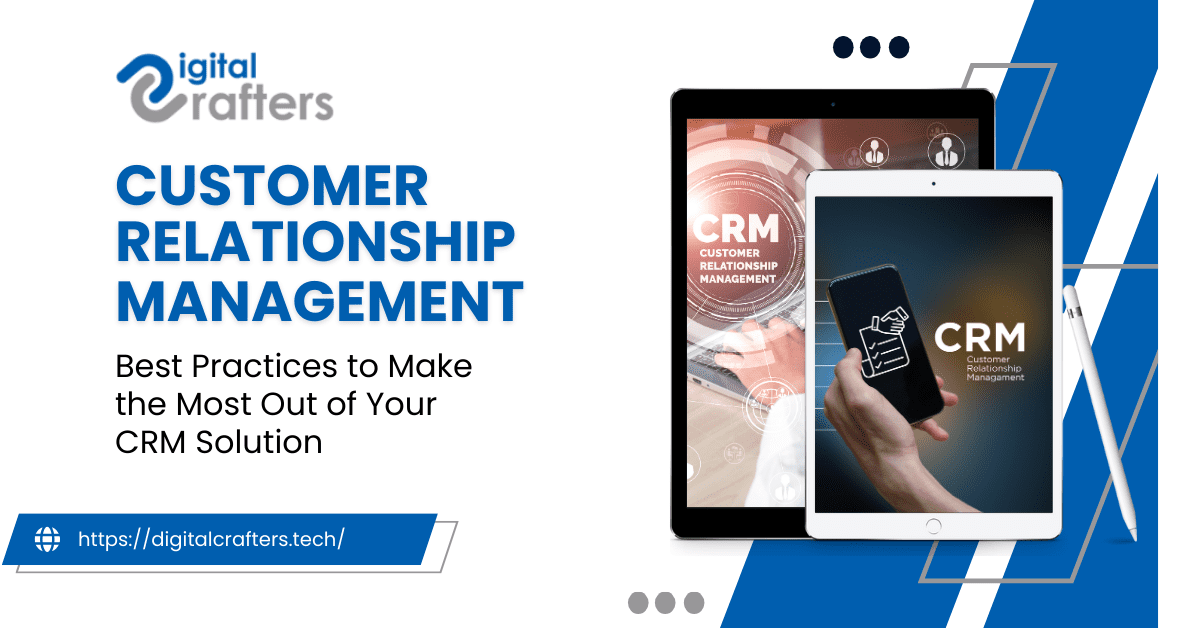
Studies indicate that 83% of internet shoppers need assistance from customer service representatives before placing orders online, making efficient customer support an integral aspect of business success. Because so many organizations recognize the necessity of providing efficient support services for customer relations management (CRM).
CRM is a customer relationship management software tool that helps organizations keep an accurate account of customer information such as purchasing history and preferences in one central place - but these technological tools will only take you so far.
If you want your customer relationship management systems to succeed, then the key best practices must be prioritized. Here, we outline top suggestions designed to maximize its worth for you.
Before we delve into the best methods for CRMs in 2024, let's briefly review some essential basics.
What is CRM?
CRM stands for Customer Relationship Management. A CRM was specifically created to handle all customer interactions within an organization and monitor these encounters for efficient management and results evaluation. Alongside tracking these customer contacts, CRMs also serve as essential performance indicators that allow teams that work directly with clients to provide sales advice or assist in making better choices while measuring overall team effectiveness.
Which are the four P's of CRM?
CRM success involves considering four pillars: planning processes, people, and platform. Establishing clear plans and processes for how your CRM software solution will be implemented allows you to focus on those at its center: individuals who utilize its features; top-quality CRM platforms tailored specifically towards the customers of your business can assist with meeting those other three Ps as part of best practices for CRM implementation.
Utilize These Best Practices for CRM Setup to Simplify Processes
Even the most sophisticated technologies become ineffective if not deployed appropriately.
To get the maximum benefits from CRM development services, users must take full advantage of it and use it efficiently. To accomplish this, they should train users on how best to utilize it.
Though initially challenging, following an effective approach will ultimately make things much simpler.
Implementing effective customer relationship management practices will enable you to use CRM software at its maximum capacity.
The CRM industry continues to become more complex every year. Now more tools and platforms than ever exist. While most customer relationship management systems offer similar capabilities and features, some go above and beyond by including advanced functions.
Although purchasing one of the CRM software with all features may seem appealing, having more features might not always meet your company's requirements.
Salesforce, as one of the leading CRM applications, is well known for its versatility and wide array of customization options; however, some smaller businesses find its advanced features intimidating when managing their CRM with them.
HubSpot lacks some advanced features offered by Salesforce; however, HubSpot has the distinct advantage of being more straightforward for teams who may not yet possess experience using CRM software.
Map your customer journey
Custom CRM development allows companies to foster meaningful connections with customers and prospects so that they remain loyal customers of yours. You can build these relationships by making it simple for customers to find your company, communicate with it directly, purchase from it directly, and ask any related after-sales questions.
An enjoyable customer experience begins by understanding customers and their specific requirements. Customer journey maps provide businesses like yours with the ability to quickly identify customer pain points.
Make sure that all of your employees have received proper training.
Many would recognize the many advantages of CRM. According to Nucleus Research, the average return on investment for CRM systems ranges between $5.60 to $8.71 for every $1 invested; but without proper employee training on its use, it quickly turns into just an expensive filing system. When providing training on custom CRM solutions used to your staff be sure they comprehend all information presented as well as conducting regular retraining sessions or tests to make sure it has been retained by employees.
Create an Implementation Strategy Plan
If your custom solution does not deliver on expectations, the issue could lie with poor implementation. Crafting an in-depth plan to implement and operate your CRM software effectively may help ensure its perfect functionality and your team knows how best to maximize its benefits.
An effective CRM implementation requires several steps. Step one involves creating the team responsible for its launch; once in place, give this group the authority and responsibility necessary for success. Designating an executive director who can make tough decisions when necessary will further ensure its success.
Best practices in CRM implementation involve setting your budget for CRM implementation, verifying integrations required as well as comparing custom CRM development services providers before gathering all needed data to support its transition. Training employees on CRM software use, testing it thoroughly, and creating an ongoing performance monitoring plan are also vital elements in its successful rollout.
Set Rules for Its Usage
Your company needs to establish rules regarding its CRM use. Make sure every employee involved receives an understanding of these guidelines to make implementation simpler for all. Make sure this document covers information needing to be documented as well as departments using it as expected and who to reach out to for any problems or errors with system usage. Consider what might take place with recorded information collected as well as its ultimate use.
Automating Repetitive Tasks
One of the greatest advantages of custom CRM software solutions is how they help make life simpler by automating repetitive administrative processes - for example creating contacts and entering data.
Integrate custom CRM tools into additional tools on your site - such as contact forms - by using an integration service. Automated systems not only speed up processes and give you time to focus on other important tasks, but they can also reduce human error.
Data Extraction.
CRMs were designed to collect and organize vast quantities of information; unfortunately, many organizations fail to make an effort to convert that data into actionable results. To be truly effective, CRMs with built-in analytics capabilities utilizing sophisticated algorithms should analyze the collected information to draw valuable insights that guide future business decisions - otherwise, all your collected information simply fills up storage space without adding anything tangible or actionable for decision-makers.
Take advantage of collaborative opportunities.
One of the greatest advantages of CRMs is interdepartmental collaboration, making use of this feature essential in departments that interact directly with customers. Collaborating across teams provides customers with an improved customer service experience because this data allows teams to communicate more clearly even though its source may come from another department.
Measure, Analyze, and Optimize
There's no one-size-fits-all method of creating the optimal customer experience; rather, each company should experiment to design one with which customers will have positive memories.
CRM tools can be highly useful tools in making customer relationship management (CRM) simpler and enhancing processes with real-time metrics that measure strategy rather than intuition. They make the entire customer relationship process less cumbersome for your team to manage effectively.
Simplify Things
Although it might be tempting to get all the latest features for your company, doing so only complicates things further. Make things as straightforward and painless as possible for yourself here.
An efficient CRM workflow will enable team members to use it effectively by eliminating cumbersome tasks that hinder day-to-day activities and increasing employee productivity.
Establishing an efficient and simple CRM workflow will assist your team in producing more effective results. Gather feedback from team members regarding any obstacles in their processes; the identification of areas for improvement can assist you in streamlining customer service operations and simplify things for everyone involved.
Technology can only be effective through its implementation.
Following these best practices for CRM will enable you to get maximum return from your investment.
Utilized correctly, CRM can assist your company in making informed decisions to support business expansion and provide outstanding experiences that foster customer retention.
Installation of an efficient CRM system will eliminate time-consuming administrative duties that limit team efficiency.
Implementing effective CRM practices will guarantee maximum returns for your company while increasing employee productivity effortlessly.
Automate Your Business Operations With Digital Crafters
Digital Crafters is a reputable CRM development company that can provide the custom CRM solutions necessary for improving sales processes and expanding your business. Their enterprise solutions are user-friendly with flexible features that enable customization based on company needs.
Digital Crafters makes creating and setting up your CRM easy thanks to our team of customer support specialists who are just an email or call away.
To schedule a free consultation, give us a call at +1-858-652-3238 or write us at info@digitalcrafters.tech
